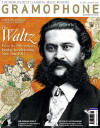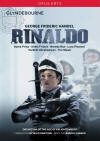Texte paru dans: / Appeared in:
*

GRAMOPHONE (01/2013)
Pour s'abonner /
Subscription information
Opus Arte
OA1081 (DVD)

0809478010814 (ID256)
Reviewer: Richard Wigmore
Carsen’s ‘St Trinians’ Rinaldo at
Glyndebourne in 2011
Handel’s first London opera caused a sensation on its premiere in 1711 , as much for its spectacular scenic effects as its music, much of it culled from earlier works. The plot — a sub Ariosto mishmash of love, sorcery and Christian triumphalism set during the Crusades — is far-fetched and creaky, even by Baroque standards. But for all its dramatic absurdities, Rinaldo contains a string of show-stoppers, most famously Almirena’s ravishing sarabande ‘Lascia ch’io pianga’ and Rinaldo’s lament ‘Cara sposa’, dubbed by the 18th-century music historian Charles Burney ‘the most pathetic song, and with the richest accompaniment, which had been then heard in England’.
With its ludicrous plot and, to modern audiences, highly sensitive subject, Rinaldo virtually demands a radical makeover. For the Glyndebourne production to mark the opera’s tercentenary, Robert Carsen treated it as a schoolboy fantasy, with shades of Hogwarts and St Trinian’s. Rinaldo is a Harry Potter figure, a bullied outsider who dreams of heroism, fantasises about his teachers and keeps a photo of Almirena on his desk. The Christian knight Eustazio is a well-scrubbed school prefect, while the sorceress Armida — the opera’s plum role — morphs from teacher in gown and mortar board to rubber-clad dominatrix. In the final ‘coro’ the fantasy fades, leaving a bemused Rinaldo alone in the schoolroom. Critical reactions to Carsen’s staging ranged from euphoria to outrage. But while such a Konzept, playing Rinaldo as ironic farce, would traduce many of Handel’s later operas, on its own zanily irreverent terms it’s inventive and entertaining.
There are some good visual gags — the explosions in the school chemistry lab, Rinaldo’s magic flying bicycle, the hilarious final battle-as-football-match. The cast throw themselves into their roles with skill and verve.
Contralto Sonia Prina sings colourfully, if not always with perfect control, and sensitively negotiates the production’s shifts between Rinaldo the timid, bewildered adolescent and Rinialdo the macho hero. As a pigtailed bespectacled Almirena, soprano Anett Fritsch is true and touching both in her birdsong aria with sopranino recorders (where the libretto’s ‘place of delight, with fountains, paths and an aviary’ becomes the school bike compound) and in ‘Lascia ch’io pianga’. The rich-toned if verbally rather vague mezzo Varduhi Abrahamyan and the firm, unhooty countertenor of Tim Mead make their mark as the Christian knights. But, as so often in Rinaldo, it is the sorceress and her lover, the Saracen king Argante, who steal the show.
Oozing malign sexuality, the vocally fiery Brenda Rae becomes a movingly vulnerable, crumpled figure in her anguished aria after she has been rejected by Rinaldo. Bass-baritone Luca Pisaroni, a born stage animal, not only sings with oaken sonority and formidable agility as Argante but also makes the king more sympathetic, less of a malevolent grotesque, than usual.
If you suspect that Carsen’s wacky take on Handel’s heroic magic opera is for you, be assured that the OAE play with style and élan under Ottavio Dantone’s energising direction. Filming is effective, though the orchestra can suffer slightly in the balance. The extras, too, are worth having, with thoughtful, unclichéd comments from producer, conductor and leading members of the cast.
Cliquez l'un ou l'autre
bouton pour découvrir bien d'autres critiques de CD
Click either button for many other reviews


